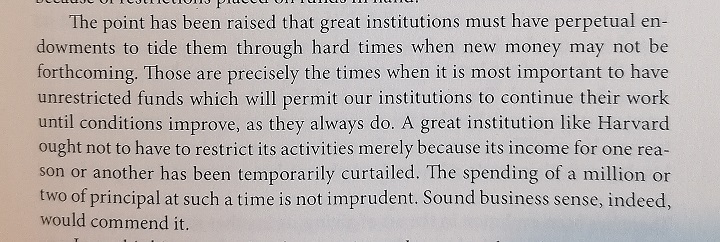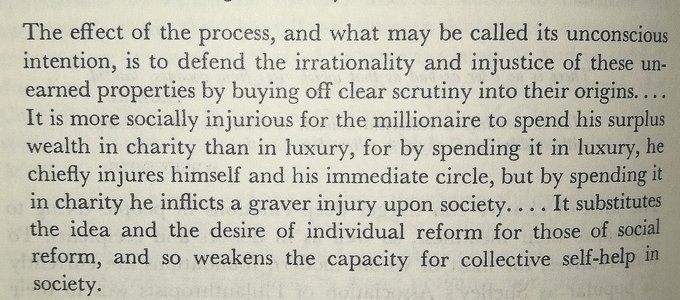Been thinking a lot about Mackenzie Scott's latest announcement and what it means for philanthropy (spoiler alert: I think it is a big deal), so thought I'd share some historical refs that have occurred to me as useful comparisons/contrasts. 1/
This is clearly in lieu of writing up a proper version of my thoughts, as I've totally run out of steam for doing that before the xmas break.
It also has little to no semblance of order. 2/
It also has little to no semblance of order. 2/
Scott's acknowledgment of the fortuitous nature of wealth and & implicit rejection of the idea that "the donor knows best" simply because they happen to be wealthy, definitely reminds me of Julius Rosenwald's endlessly-quotable take on the same qn: 3/
In recognising the problematic nature of the inequality that made her wealth possible, she comes close tothe pronoucments of Charles Garland, who initially rejected an inheritance built on Wall St finance (but later accepted & founded a progressive foundation with the money): 4/
And actually, if you look at Merle Curti's recounting of Garland's view on wealth, maybe it's even closer to Scott? 5/
In her focus on (at least partly) funding systemic change efforts, and recognising that this requires empowering grantees, Scott seems to echo the approach of Edith Stern and the Stern Fund (under the leadership of David Hunter): 6/
Her rejection of restricted funding and perpetuity clearly echoes that of Julius Rosenwald (Edith Stern's father btw), who argued passionately against both: 7/
In the sheer pace of what she's doing, seems to me Scott is also clearly rejecting some of the assumptions in Carnegie's famous dictum that "It is far harder to give money away intelligently than to earn it in the first place".
(Which isn't to say what she's doing is easy!) 8/
(Which isn't to say what she's doing is easy!) 8/
In being unafraid to re-emphasise the importance of human connection in philanthropy, but needing to combine that with an approach that has sufficient rigour, Scott very much harks back to Josephine Butler's words: 9/
It also evokes Jane Addams writing on the limitations of "scientific" approaches to philanthropy that fail to take heed of the vital human element: 10/
Finally, for a bit of grit in the oyster, some of the criticisms I have seen that Scott's philanthropy may be laudable in itself, but are problematic because they help prop up a wider system that requires fundamental reform, definitely echo these harsh words of JA Hobson: 11/
Of course, even if there are some interesting precedents, it doesn't detract from what Scott is doing.
In combining these different elements (or doing it at the sheer scale she's able to), it may well be that we are seeing something genuinely unprecedented. Time will tell. 12/
In combining these different elements (or doing it at the sheer scale she's able to), it may well be that we are seeing something genuinely unprecedented. Time will tell. 12/
Anyway- there's a mishmash of thoughts. Feel free to piece them togther yourself into something coherent (like some kind of lazy intellectual jigsaw you've been given by a well-meaning but chaotic uncle). Fin/

 Read on Twitter
Read on Twitter










